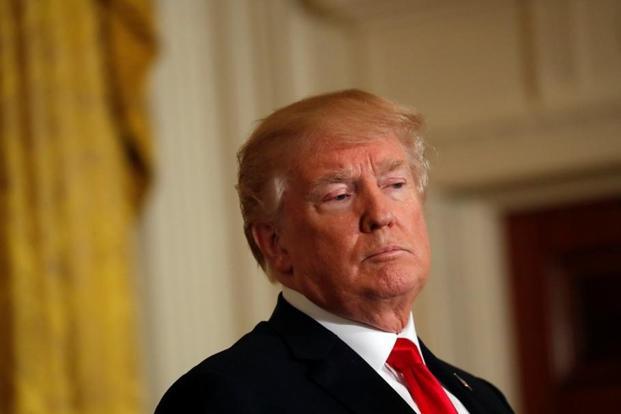Trump trade wind just a breeze for Asia stocks inured to pain

Hong Kong: While trade paranoia engulfed everything from US index futures to the dollar and bond markets, it was a different story for Asian equities, as investors weighed competing risk factors affecting the outlook for a region square in the targets of President Donald Trump.
Stocks across the Asia-Pacific region showed lighter reactions after Gary Cohn resigned as Trump’s top economic adviser and the US prepared to impose steep tariffs on steel and aluminium. One explanation may simply be that they are priced to absorb more pain: benchmarks in Japan, Korea and China are nursing losses of up to 6% this year, while the S&P 500 was up as of Tuesday’s close.
On Wednesday, the Shanghai Composite Index added as much as 0.6% before falling by the same amount as Trump also reportedly threatened additional measures specifically targeting China for its alleged theft of intellectual property. South Korea’s benchmark Kospi Index ended lower after an earlier gain amid optimism over denuclearization talks with North Korea. The Topix lost less than half as much as S&P 500 futures, which tumbled as much as 1.6%.
Asian investors can afford a more measured view on prospects for a trade war that will probably never happen, said Kerry Craig, a Melbourne-based global market strategist with JPMorgan Asset Management which has about $2 trillion of assets under management.
“There’s definitely more comfort, or realization, out of Asian markets about the material damage that this could actually have as being quite targeted and specific rather than being something that was going to be blanket,” Craig said.
It’s unclear how exposed Asian nations are to potential US sanctions. The Trump administration is considering clamping down on Chinese investments in the US and imposing tariffs on a broad range of its imports to punish Beijing for its alleged theft of intellectual property, according to people familiar with the matter. An announcement following an investigation by the US Trade Representative’s office into China’s IP practices is expected in the coming weeks.
Prior to that news, Macquarie Research said in a 2 March note that China’s impacted exports to the US account for about 0.02% of its gross domestic product. Australia, another major commodities exporter in the region, would face a similar impact, the report said.
Stefan Hofer, Asia chief investment strategist at LGT Bank AG, added Hong Kong’s stock market is relatively insulated from trade war concerns with the local economy dominated by financials and property companies. There may be spillover effects if the US targets Chinese semiconductor exports, but that scenario is a long way off, he said in an interview.
“There’s still little detail on exactly what these tariffs are going to be,” JPMorgan’s Craig said. “That’s perhaps one of the reasons you haven’t seen a lot of headlines about what China might do, or anyone else. The impact if it’s geared towards China is not that big because they’re not a big steel exporter to the US. They export consumable goods.”
Not everyone is so rosy. Cohn’s departure as one of the few moderating voices in the White House may also mean greater influence by hardline nationalist and protectionist forces and more disruptive policies down the road.
“This is massive in many ways, from a financial markets perspective,” said Kay Van-Petersen, a Singapore-based global macro strategist with Saxo Capital Markets. “He was the one semblance of stability in the White House. With Cohn gone, the chances of a trade war have now really taken off. Cohn was basically holding back Trump. There is no one else to do that.”
That said, Trump could just as well walk back his comments—leaving investors where they were before, facing an uncertain outlook, said Shane Oliver, head of investment strategy and chief economist at AMP Capital in Sydney.
“Maybe tonight Trump comes out and says he’s not going to back down, he’s going to have these tariffs but he’s going to make some exemptions for some countries,” Oliver said. “That’s seen as a bit of a back down and the market says, ‘Oh, it’s not as bad as we thought.”’ Bloomberg
[“Source-livemint”]




